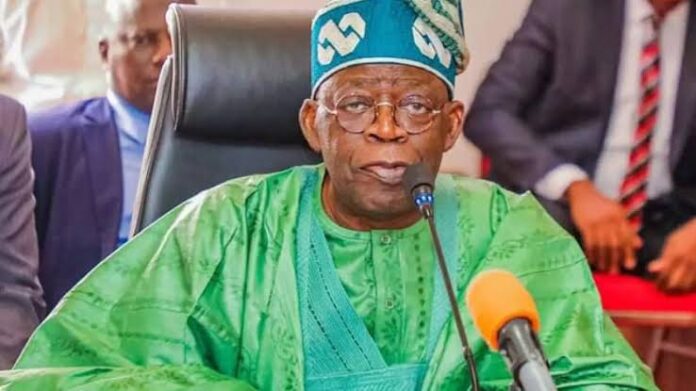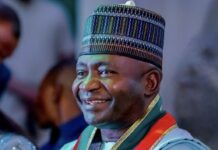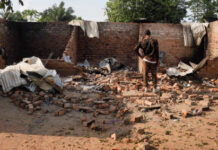By Abdul Mahmud
Two incidents drew attention to our country’s deepening security crisis this month. The first happened in Zamfara State. A pregnant woman was abducted by terrorists. She gave birth to twins while in captivity. The leader of the terrorist group took her newborn twins and he threw them to his dogs. The dogs ate the babies alive one after the other.
The second occurred in Kogi state. Lanlege Samuel Adewale was kidnapped in Kabba. He tried to protect his neck from a machete. His left hand was chopped off instead. These are not moonlight tales spun to amuse children or transmit ancestral wisdom. They are not the parables of old, meant to echo the values of bygone eras or light the moral path for the future.
Or put another way, they are not the moral scaffoldings of ancestral wisdom. They are not the echoes of a noble past meant to instruct the future. No. These are the brutal chronicles of a country in descent. These are simply the grotesque accounts of a country that bear neither lesson nor legend, only the raw stench of evil and the deafening silence of a state in retreat.
Such horrors happen every day. Some are reported. Most are not. The victims vanish into the dark forests of our country. Families pay ransom, bury the dead, or live with permanent scars. The ones live to recount their stories.
This is not just about crime. It is not just insecurity. It is a state failure – a classical state failure. Across large swathes of our country, the government no longer governs. Bandits and terrorists have taken over. They run parallel governments. They control territories. They rule by fear. They collect taxes. They impose laws. They deliver jungle justice. There is a governance crisis. A catastrophe that is palpable and visible. The basics of statehood are absent. Where our country isn’t struggling to exist within itself, it is ceding many parts of itself. It no longer imposes its authority in many parts. In some places, it is an absent authority. From Zamfara to Katsina. From Borno to Zamfara, Plateau in-between, bandits and terrorists have seized land, people, and local power.
From Kwara to Niger, they are building and resuscitating terror cells. Abuja is too close for comfort. Be afraid; be very afraid. Of the truth, these are not ragtag criminals. They are terrorists. Organised. Armed. Funded. And strategic, to the extent that their purpose is to turn our country into an Islamic caliphate.
They understand our country’s weaknesses. And they exploit them.
Meanwhile, our country is slow to tackling the menace. Disorganised. Reactive. Often silent. Security meetings have become the favourite occupation of the president and his men. All talks about threats to national security. No action.
The threats grow. The danger gets closer home. The military is everywhere. But nowhere. Soldiers are deployed in 34 of 36 states. Still, citizens are kidnapped daily. Villages are attacked. Markets are raided. The police are overwhelmed. Intelligence agencies don’t coordinate. Information is hoarded, not shared. Budgets are announced, but weapons don’t arrive. Fighting troops complain of old rifles, low morale, and unpaid allowances. The security architecture is broken.
But, perhaps, the most tragic failure is the State Security Service (SSS). This is the Service that should be leading the fight against terrorism. The one with the power to detect plots, infiltrate networks, and prevent attacks.
But what does it do? It tracks critics. Professor Pat Utomi is its latest victim. The grouse against him is that the opposition’s shadow government he proposes in a democracy is a threat to democracy itself. Ludicrous! Utomi is not the threat. The real threats are the terrorists who operate in the forests of our country, occasionally foraying into towns to cause mayhem and chaos. But the SSS chases citizens rather than hunt down the terrorists. Our country is on fire, and our spooks are chasing rats. This is not intelligence work. This is a distraction. And it is dangerous. Does it not show how far our country and its institutions have drifted from their purposes?
The duty of any country is to protect lives and property. Everything else comes after. If a government cannot provide security, it loses legitimacy. Here, today, legitimacy bleeds. Citizens no longer trust their country. They no longer rely on it for safety. They turn to local hunters, vigilantes, and militias. In the North-West and North-Central, armed groups like Yan Sakai and local vigilantes fill the gap.
In the South-East, the Eastern Security Network claims to defend the Igbos. In the South-West, Amotekun was born out of frustration.
These groups often do what the police won’t. But they are not trained. They are not regulated. Sometimes they protect. Other times they kill. They will eventually become the problem. Sooner. Not later.
The more people turn away from our country, the weaker our country becomes. This is how countries collapse. Not all at once. But in pieces – Village by village. Town by town. City by city. State by state.
The warning signs are clear.
More than 3 million citizens are displaced. Whole communities have fled their ancestral lands. Children are out of school. Farmers have abandoned farms. Food prices have soared. Bandits burn crops and demand ransom before planting. Insecurity now fuels hunger. Hunger fuels desperation. Desperation fuels violence. The economy suffers. Investors flee. Jobs vanish. Even Abuja, once safe, is under siege.
Kidnappings happen in the suburbs. Gunmen raid homes. No place is truly safe. Our country is under siege. But this government acts like it’s business as usual. Its spokespersons hold press briefings. They issue press statements. Occasionally, the president issues marching orders to the Service Chiefs. The Service Chiefs make promises. The other arm of government, the legislature, often straddles the Fanonian fence of indifference, watching crises unfold like a passive spectator.
Now, and then, it stirs like the wind in the trees, bringing nothing to life, to paraphrase that late great American writer and humourist, E.B White. It is always half-awake, half-concerned.
Its knee-jerk? A committee. Then another. An endless parade of legislative committees clothed in the garb of urgency.
The latest act in this tired play is the proposed Senate’s ad-hoc committee, chaired by my old friend, Opeyemi Bamidele, to organise a three-day national security summit. Another grand convocation of platitudes. Another theatre of absurd deliberations. But as always, no plan, no resolve, no action, just photo ops.
Just echoes in the hall, and silence on the ground. Then, they move on. The killings continue.
The government must change course. And it must act fast. Security must be redefined. Not just by the number of troops. But by presence, intelligence, speed, and effectiveness. Security agencies must share information. They must work together. Not against each other.
The State Security Service must turn its gaze in the direction of terrorists, not on the tongues of citizens. Its mandate is to safeguard the nation, not to muzzle dissent. President Tinubu once declared, “Let the poor breathe.”
I say now, with equal urgency: let the citizens speak. Let them question. Let them protest. Let them shout into the winds of power without fear. For the lifeblood of democracy is not silence, but speech.
The real enemies of the state do not hide behind hashtags. They bear arms and spread terror. The threat is not in tweets, but in the ticking of bombs. The top brass of our military must shed its old, corrosive habit of turning defence budgets into personal fortunes.
The battlefield, not the bank, is where its loyalty must lie. Their true duty is not in procurement scandals, but in the protection of citizens. It must secure our borders with honour, and neutralise the terror that stalks our country. It must dismantle every enclave where terrorists find shelter, where fear nests and multiplies.
But more than that, it must wage a parallel war for the hearts and minds of our citizens. For no victory is complete if communities feel invaded, not embraced. The soldier must be seen not as a conqueror, but as a shield. Not as a stranger, but as a guardian-angel.
When our police force isn’t engulfed in bribery and corruption, it shows up shaking down citizens at roadblocks and on street corners, not injustice. Its presence breeds fear, not safety. This must change.
We need a new vision of policing; one rooted in reform, not repression. A Police Force that serves, not shakes down. Our country cries out for local policing. Officers drawn from our communities.
Trained not only in tactics, but in the language and customs of our people. Equipped not just with weapons, but with intelligence, empathy, and the trust of those they serve.
Real security begins when the badge is a symbol of safety, not the insignia of exploitation.
Security, though essential, is not sufficient on its own. No country shoot its way to peace. Citizens must confront the uncomfortable truths. They must ask the tough questions: what drives their compatriots into the arms of bandits and terrorists? What poisons their souls so deeply that terrorism, banditry and kidnapping become their vocations?
The answers are etched in the margins of society: anger, poverty, unemployment, despair. These are not just statistics; they are the seeds of rebellion, sown in the fields of the countryside abandoned by justice and forgotten by opportunity.
Until our country addresses the silence in empty stomachs and the ache in idle hands, the minds of those left behind, forgotten, will remain the devil’s workshop.
No wall will be high enough, no gun will be strong enough to secure the peace our country seeks.
But, there are specific things our country must do to stem the blood tide. The North, which is at the heart of the current conflagration, has millions of out-of-school children. The highest in the world. These children become easy targets.
Our country and its rulers must invest in education. In jobs. In agriculture. In dignity. When angry children have no stake in a country, they are the first to join up in the parade of torches to burn their country. Governors must stop building endless flyovers where there are no persistent gridlocks. And start building security. They must stop funding convoys that stretch from Timbuktu to Samarkand. Serengeti, in-between. And start funding police stations. They must stop stealing. And start governing. Tinubu’s government must lead. But states must act.
There is no excuse for this terror stalking our country. None. Our country is bleeding. Citizens are already losing faith. Losing hope. Every day, more citizens flee. To Europe. To Canada. To anywhere. Those who stay live in fear. Our country and its rulers must act now. Or it will be too late. Our country needs to be saved. But saving it requires courage. Truth. Discipline. It requires facing reality. Not spinning lies. Time is running out.
Our country is burning. While history has many examples in Somalia, Libya and Syria, our rulers should stop chasing rats.
They should put out the fire as citizens mourn their dead. And Nigeria mourns. In this shadow of mourning, grief descends like a heavy fog, thick, suffocating, inescapable. Hearts, fragile and weary, reach out for solace. In the sacred rhythm of the Beatitudes, we hear the solemn promise: “Blessed are those who mourn, for they shall be comforted.”
But in our country of unending funerals, who brings comfort to mourners? Who wipes the tears of mothers burying sons, of fathers clutching silence where laughter once lived? Who stands in the breach for citizens battered by loss and forgotten by power?
Nigeria mourns, but where is the hand that heals? Where is the balm for this collective sorrow?










